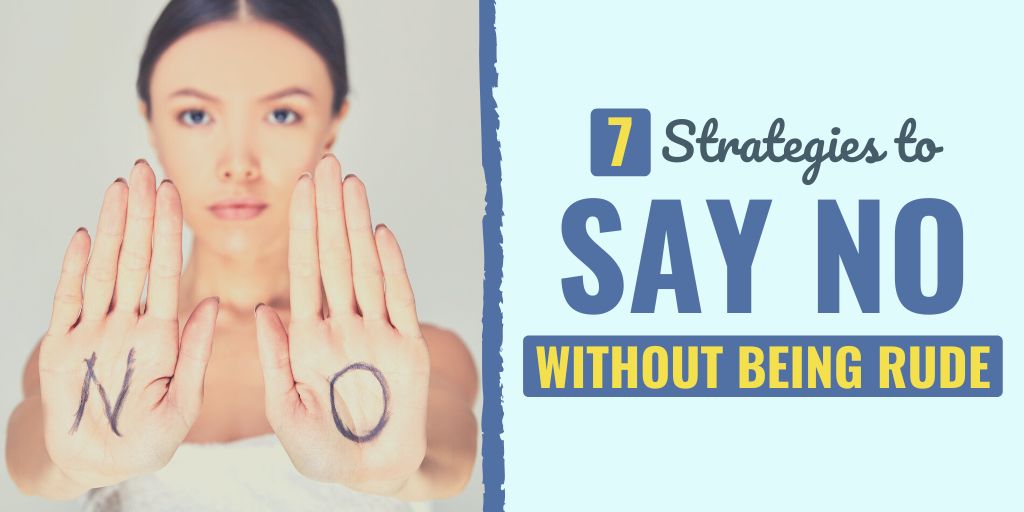There might be affiliate links on this page, which means we get a small commission of anything you buy. As an Amazon Associate we earn from qualifying purchases. Please do your own research before making any online purchase.
One of my daughter’s friend’s mom recently asked me if I could take her daughter for the afternoon because she had a few things come up.
My schedule was already jam-packed and I was struggling to figure out how I was going to handle having my own daughter that day, so I thought to myself, “Absolutely not, are you kidding me? At the last minute? No way!”
But I said yes.
I was put on the spot, I didn’t want to let her down, and I felt like she had already handed the responsibility over to me.
If you’re a people pleaser like I am, you probably have a hard time setting boundaries or sticking to them. As social beings, we strive to preserve our relationships with other people, which makes it hard to let people down, even if it’s in our own best interest.
In this article, I am going to talk about how you can comfortably say “no” to people. I will offer strategies that you can use to decline other people’s requests without being rude and tips to help erase any associated guilt.
But first, if you prefer to watch instead of read, here's the video version of this article:
Now, let’s look at why you should say “no” more often.
Why You Should Say “No” More Often
As children, we were taught to say yes. If your mom asked you to do something, you were expected to agree to it. Once you were in school, if friends asked you to tag along with them on the playground, you did so because you wanted to be accepted.
Now in adulthood, you may find yourself saying yes to every request made of you so you can be seen as a team player or as someone who doesn’t question authority.
People often say yes in social situations to avoid letting others down or because they feel trapped.
We feel bad for being that one parent who doesn’t give money toward the group holiday gift for the teacher or one of the few employees who doesn’t volunteer to help decorate for the office party.
Research has actually found that we would rather deal with the inconvenience of saying yes than other people’s potential judgement.
While you want to be helpful and available to those who are in need of some type of help from you, it can also be a burden to carry this load–not just because it adds extra things to your to-do list, but also because the urge to say yes often comes with a lack of self-value.
Think about this for a second. If you say yes, even when something is really inconvenient for you, it’s probably because you don’t want the other person to be mad at you or to reject you in some way.
You want them to accept you and appreciate you. You’re choosing to value their feelings (or time) over your own priorities. Sometimes it feels easier to say “yes” than to deal with the angst that comes along with saying “no” or other people’s reactions to your declination to help.
However, when you say yes at times when a “no” is warranted, you’re giving up your power and control and you’re prioritizing the needs of other people over your own.
As you’re justifying your decision in your head, you’re disrespecting your own needs because you’re making up reasons why it’s ok to spend your time in a way that doesn’t ultimately help you reach your own goals.
But while you may tell yourself that it’s not that big of a deal or it’s “just this one” time, it actually is a big deal. Every time you say yes, you’re choosing to ignore what you know is best for you, and you may be putting the quality of your work in jeopardy.
What Always Saying “Yes” Leads To?
Saying yes can have negative impacts on your health and can be a recipe for exhaustion. Let’s look at some of the specifics.
Increased Stress
Agreeing to do something that you don’t want to do creates stress. It can lead to anxiety, tension, muscle aches, and a loss of sleep. However, saying yes when you don’t want to is one cause of stress that is easy for you to control.
You are less likely to feel overwhelmed if you can learn how to be comfortable saying no to people.
People Taking Advantage of You
If people know that you will say yes to anything that’s asked of you, you’re putting yourself at risk of being taken for granted.
Those who are willing to take advantage of others and duck out on their own responsibilities are often master manipulators who use guilt to pressure you into saying yes.
These people will sometimes ask you until you give in. If they see a weak spot, they may try to turn your initial no into a yes, which can be tricky to handle. We will look at some strategies to address this issue later.
Wasted Time
Only you can control the 24 hours that you have every day. Spend your time in a way that is in line with your own priorities instead of allowing someone else to create your schedule or to-do list. Focus on what’s important to you.
To ensure that you don’t waste your time (either on other people’s responsibilities or in general), you need to be clear on what your priorities are. Knowing this will help you say no to people with more conviction.
Decreased Focus
When you have way too much on your plate, you will probably try to multi-task or rush through your work. You will have a hard time sitting down and giving all of your focus to the task at hand.
Only agree to do things that are relevant to your goals so you don’t become distracted when you’re trying to be productive. If you want to be intentional with your life, only say yes to things that align with your values.
Decline any tasks that take away from what you want or that may cause you to lose focus.
Say yes to things that sound like they could turn out to be a good learning opportunity or things that could help you grow personally or professionally. Also say yes to things that you find to be interesting. But say no to anything else.
Depleted Energy
Taking on unwanted responsibilities that you don’t have time for wastes the energy that you could be spending on things that you do care about.
Reserve your energy for doing a better job on the tasks that you either have to do or want to do. Having more energy will lead to increased productivity and a happier state of being.
Now that you know why you should say no more often, let’s look at some strategies that you can use to do this without being rude.
7 Strategies For Saying No Without Being Rude
1. Know Your Priorities
If you know your priorities, you will know exactly what to say no to. This will help you say no with a sense of conviction, as you can objectively decide which opportunities are good for you and which ones will just drain you.
So before you run out and start saying no to everything, be sure that you’re clear on your goals and priorities.

One thing to keep in mind here that I know I struggle with sometimes is to not compare the importance of what’s on your schedule to whatever is being asked of you.
For example, if you’re asked to help with a fundraiser for children with cancer and you had already planned to go to lunch with a friend, don’t let the guilt creep in by thinking that you could go to lunch with your friend on a different day.
If the cause is important to you, you will find ways to support it without having to rearrange other things that are on your priority list. You don’t need to rank your obligations in order of the amount of impact they will have on the world.
Rather, rank them according to the impact they will have on your world. This isn’t meant to sound selfish, but you have to do what’s in your own best interest and prioritize your time in a way that will help you lead the most fulfilling life.
This also goes to show why it’s a good idea to block everything off on your calendar. When you have your priorities already marked off in your planner, you’ll be able to see that you have a commitment and you don’t even need to look at the details of that commitment.
Research has shown that if you have a specific plan before being confronted with another person’s request, you’re more likely to stick to your original plan. This will also help you see when you actually do have time to help if you are interested in doing so at a later date.
2. Turn a “No” Into a “Not Right Now”
If it’s 2:30 and you have something you’re working on that is due by 4:00 and a co-worker comes into your office asking for “5 minutes” of your time, you probably already know in your mind that “5 minutes” actually means 30.
In a case like this, instead of saying no, you can say, “I’m working on something urgent right now, could we meet at 4:15?”
The key to this response is using the word urgent. You may be tempted to say you’re working on something important, but that’s always subjective. Saying a task is “urgent” will discourage further questions.
By saying “not right now” instead of no, you’re not completely shooting the other person down, but you’re making it clear that your priorities come first.
3. Honesty is the Best Policy
If you know the answer is no, don’t string someone along by saying maybe–or even yes–without an intention of following through. Not only will people respect this more, you will also be saving them the trouble and stress of wondering if you’re ever going to come through for them.
If you aren’t planning to take any action on the requested task, let the other person know that so they can move on.
Honesty will also come into play if you’re asked to do something that is unethical.
For example, let’s say a co-worker (who is also a friend) asks you to sign them in for a meeting that they’re not actually attending because they’re too busy. Two things come into play here, compassion for your friend and your integrity.
To say no, address both of these factors. Say something like, “I’m sorry to hear that you have a lot on your plate right now, and I wish I could help, but honesty is really important to me and I can’t lie for you.” Be compassionate in your response, but don’t compromise your character.
4. Don’t Over-Explain
You may be tempted to give an explanation or a reason when you say no because you don't want the person who is asking for your help to think you're saying no just because you don’t want to help.
This isn’t to say you shouldn’t provide any context for your answer, but trying to explain too much will give people a reason to try to change your mind.

When you give an excuse, you’re also giving an opportunity for the person who is requesting your help to solve whatever problem is keeping you from helping them.
They may keep trying to convince you that you can do what you have to do and help them. If you really don't want to do something, leave any explanations and excuses out of it. If you try to justify your answer too much, it could start to sound like you’re lying.
However, just saying no without giving any context could sound harsh. Instead, try, “no, I don't have time right now.”
You can also add in a “but thank you for asking” if you feel like you need to add some politeness. The idea here is to avoid giving too much information because it could lead to issues and show that you feel guilty about declining the request.
5. Offer an Alternative
If you can offer someone an alternative, you may still be able to help them out without doing what they asked of you.
Try to offer a relevant solution, whether it is suggesting someone else who you believe could do the job or volunteering to a smaller commitment that can still help out but is on your own terms.
Don’t assume that the person who is asking you for help isn’t willing to be flexible. Chances are, they will be grateful for any help that you’re willing to offer.
6. Communicate with Confidence
Speaking with a sense of confidence is critical when you’re communicating your personal needs. When people know you’re sure of yourself, they’re unlikely to keep pressuring you. Most people don’t want their friends or colleagues to be over-burdened with things to do.
If you do find that someone continues to ask you for your help after you have already said no, just let the person know that you hear what they’re asking of you but you’ve told them no and your answer isn’t going to change. Being confident or assertive in your answer doesn’t equate to being rude.
7. Incorporate a Compliment
Let’s say a co-worker comes to you for help on a project and you don’t have the capacity to take it on right now. To ensure you leave the interaction on good terms, incorporate a compliment when you’re declining to help.
“Thank you for thinking of me as someone you believe would be able to do this project. However, I’m unable to at this time because the annual projection reports are requiring my full attention and will for the next week or so.
I’m certain that you will do a great job on this project, as you always do. I think we’re all feeling the pressure with our looming deadlines.”
In this example, you’re telling the person that you have faith in their ability to get the work done and mentioning their past successes. You’re also relating to their level of stress by recognizing everyone’s large workload.
Final Thoughts on How to Say “No”
It is within your power to accept or decline things that are asked of you. You should say “no” more often in an effort to realize your own value and give yourself the time to focus on what’s important to you.
Each time you say no to someone else, you’re saying yes to yourself. You’re taking control of your life by refusing to allow others to make your choices for you. You will gain confidence each time you stand firm within your set boundaries.
If you can learn to say no to the right things and yes to the right things, you will be able to achieve a new level of productivity and leadership potential.
By saying no, you will also gain the respect of other people. If you’re clear about what you are and aren’t willing to do, others will respect you more, and you will be demonstrating a strong sense of self-confidence.
Making the effort to limit your time to doing activities that you actually enjoy or that you’re responsible for will help you ultimately find life to be more fulfilling.
Now, saying no doesn't always need to be serious. Here are some funny yes or no questions you can use as conversation starters.
And if you're looking for ways to improve the way you turn down people, be sure to read these articles:
- 31 Good Excuses to Miss Work on Short Notice (EXAMPLES)
- 9 Ways to Be a Good Communicator Throughout Your Life
- 11 Ways to Improve Your Interpersonal Communication Skills
Finally, if you want to take your goal-setting efforts to the next level, check out this FREE printable worksheet and a step-by-step process that will help you set effective SMART goals.

Connie Stemmle is a professional editor, freelance writer and ghostwriter. She holds a BS in Marketing and a Master’s Degree in Social Work. When she is not writing, Connie is either spending time with her 4-year-old daughter, running, or making efforts in her community to promote social justice.


